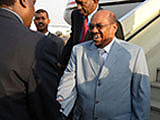Bringing down al-Bashir
By Claudio Guler for ISN
An official indictment against Sudanese President Omar Hassan Ahmad al-Bashir is external page expected sooner rather than later, possibly before the end of February, which would make the embattled leader the first head of state indicted by the International Criminal Court (ICC).
ICC Chief Prosecutor Louis Moreno-Ocampo external page applied for an arrest warrant on 14 July 2008 for charges that include 10 counts of war crimes, crimes against humanity and genocide. The issuance of an arrest warrant will mark a milestone for the ICC, the people of Darfur and international criminal law in general.
The Darfur conflict started in February 2003. In an attempt to take advantage of the political opening generated by negotiations on the Comprehensive Peace Agreement (CPA) - which tenuously ended the 20-year North-South civil war in Sudan - the Justice and Equality Movement (JEM) and the Sudan Liberation Army/Movement (SLA/M) launched attacks on Sudanese government installations. Their grievances focused on Khartoum’s economic and political marginalization of Darfur; issues aggravated by encroaching desertification and increased resource competition.
Khartoum’s response was devastating. It funded the janjaweed militias to carry out, in collaboration with the armed forces of the government of Sudan, a heinous campaign of violence against the people of Darfur. The conflict probably remains - save for the Second Congo War - the international community’s most neglected of the past decade.
President al-Bashir came to power in 1989 when, as a colonel in the Sudanese army, he orchestrated a bloodless coup that ousted democratically elected prime minister Sadiq al-Mahdi. The Revolutionary Command Council for National Salvation was installed and al-Bashir was declared its chairman. In 1993, al-Bashir dissolved the council and appointed himself president.
On 31 March 2005, the UN Security Council adopted Resolution 1593 that referred the situation in Darfur to the ICC. Two of the UNSC's permanent members, the US and China, abstained from voting. The US, actively opposed to the ICC under the Bush administration but committed to pursuing justice in Darfur, did not block the resolution’s passage. China, which maintains significant economic investments in Sudan’s petroleum sector, expressed its preference for a national prosecution, but normative pressures likely persuaded it to abstain as well. With Resolution 1593 adopted, Ocampo opened his investigation.
The prospects for an indictment appear to have unsettled al-Bashir. In October 2008, the GoS external page embraced a Qatari initiative sponsored by the Arab League and the African Union to negotiate a peace settlement. Shortly thereafter, on 12 November 2008, al-Bashir external page ordered an immediate ceasefire to the Darfur conflict. He has called for similar ceasefires before, and they all proved fleeting. These expediently timed examples, nevertheless, suggest some limited vulnerability to normative pressures.
Ocampo’s warrant request will likely be approved, but the charge of genocide may be dismissed. In his application, the chief prosecutor noted that al-Bashir “masterminded and implemented a plan to destroy in substantial part the Fur, Masalit and Zaghawa groups, on account of their ethnicity.” In the event Ocampo fails to meet the evidentiary threshold for genocide, he could still move forward with the war crimes and crimes against humanity charges. His reputation, however, would take a hit.
It would come in addition to his office’s external page mismanagement of potentially exculpatory evidence in the case against Thomas Lubanga Dyilo, former leader of the Union of Congolese Patriots (UPC). This misstep delayed Lubanga’s trail and raised suspicions concerning Ocampo’s prosecutorial integrity.
When an indictment is handed down, al-Bashir’s reaction will be closely watched. The possibility remains that he may retaliate by authorizing another campaign of violence.
The eventuality illustrates the peace versus justice debate, and raises the prospects for an Article 16 suspension. Article 16 of the Rome Statute permits, by vote of the UNSC, the suspension of an ICC investigation for one year and is renewable. Both France and the UK have hinted at supporting an Article 16 suspension, but their final intentions remain uncertain. China probably wishes it had vetoed Resolution 1593 when it had the chance. Now it finds itselfexternal page lobbying UNSC members to support a suspension. A US veto could in any case block such an initiative. It remains to be seen how the Obama administration will act.
The janjaweed and the armed forces of the government of Sudan have ravaged Darfur. Of a population of 6-7 million, the UN external page claims that possibly 300,000 plus Darfurians have been killed, up to 2.6 million displaced, and 4.7 million affected by the conflict. Given al-Bashir’s ruthlessness and insincerity, as well as the broad measure of neglect the international community has already demonstrated on Darfur, delaying the pursuit of justice will only exacerbate the plight of Darfur, not improve it.
Once an arrest warrant is issued, one critical matter then remains outstanding: How to go about apprehending al-Bashir? As of yet, no plan exists.
